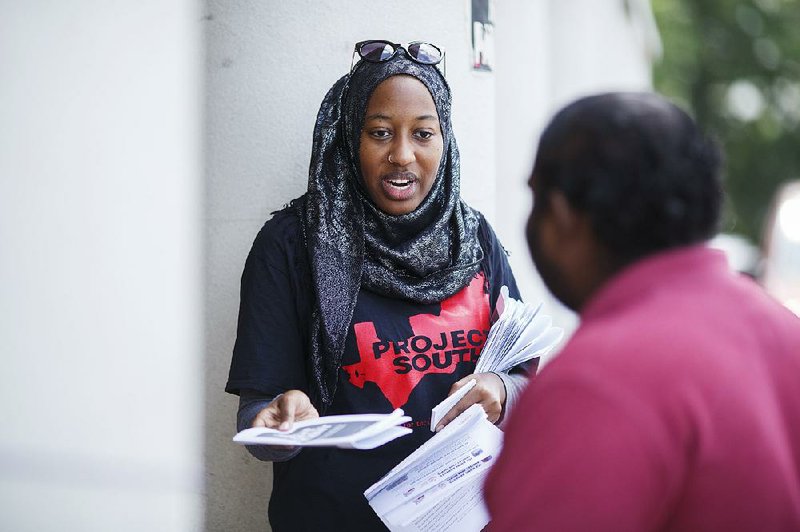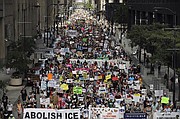LOS ANGELES -- With a new round of immigration raids set to begin today, hundreds protested in Southern California and migrants targeted by the crackdown prepared for the federal action.
Many elements of the raids remain unclear, including exactly how many are being targeted and how much the new action will be different from regular Immigration and Customs Enforcement activities.
"We are receiving calls from migrants that are very scared," said Hugo Castro with Border Angels, an advocacy group for migrants. "They are canceling their plans for the weekend. For example, we talked to one family who was planning to move this weekend and now they are afraid to move with this going on."
On Friday, President Donald Trump confirmed to White House reporters what he called a "major operation" starting today.
"Nothing to be secret about," Trump said before leaving for a fundraising trip. "It starts on Sunday, and they're going to take people out, and they're going to bring them back to their countries. Or they're going to take criminals out, put them in prison, or put them in prison in the countries they came from."
Trump didn't comment on how many people might be affected.
An Immigration and Customs Enforcement spokesman would not give many details.
"Due to law-enforcement sensitivities and the safety and security of U.S. Immigration and Customs Enforcement personnel, the agency will not offer specific details related to enforcement operations," a statement read.
The raids, which could roll out over an extended period, are expected to take place in at least 10 cities. While the operation will target some 2,000 people with court removal orders, it will include "collateral" deportations in which agents may detain migrants who are not intended targets but happen to be in the area.
The raids are expected to target not only families but also children who arrived at the border without adults, were released to parents or other sponsors and ordered deported, said Greg Chen, director of government relations at the Washington-based American Immigration Lawyers Association.
Immigration and Customs Enforcement officials in New Orleans have announced that they were suspending immigration enforcement this weekend in areas of southern Louisiana and coastal Mississippi where Tropical Storm Barry made landfall early Saturday.
But migrant advocates called on the agency to suspend the raids in surrounding states so that migrants felt safe evacuating.
Some migrant families directly in the storm's path said they were too scared to evacuate. Balbina, 34, a Mexican migrant who asked to be identified only by her first name, has been living south of New Orleans illegally for 12 years.
She and her husband, a boat builder, have three children, ages 14, 10 and 5.
The two youngest are U.S. citizens. A voluntary evacuation was issued for their town, but Balbina's family is staying in their mobile home, and she knows about 35 other people who are also afraid to leave because of the raids.
"I worry for my kids. I can try to protect them, but it's a risk. If we go, we don't know if we can return," she said by phone from her home.There's a 10 p.m. curfew in town, she said, but for migrants, "It's like a curfew all the time."
Matthew Albence, the Immigration and Customs Enforcement acting director, told The Associated Press that the targets were on an "accelerated docket" of immigration court cases primarily set up for Central Americans.
"This family operation is nothing new," Albence said. "It's part of our day-to-day operations. We're trying to surge some additional resources to deal with this glut of cases that came out of the accelerated docket, but after this operation is over, these cases are still going to be viable cases that we'll be out there investigating and pursuing."
The threat of raids has had a dramatic impact. In Los Angeles, Mayor Eric Garcetti, Police Chief Michel Moore, Sheriff Alex Villanueva and other leaders have denounced the tactic. Across the country, some migrants reportedly are skipping work and hiding out, a team of immigration lawyers is descending on a detention facility in Texas, activists are manning tip hotlines that are ringing off the hook in Tennessee, and a group of advocates filed a pre-emptive lawsuit in New York.
Several thousand people marched Saturday through downtown Chicago to protest the planned sweeps.
The marchers' chants were critical of Trump and the Immigration and Customs Enforcement agency. Many of the protesters carried placards with messages including "No kids in cages" and "Abolish ICE."
Police spokesman Anthony Guglielmi said the protest was peaceful and that there were no arrests, with the crowd estimated at 5,000 marchers at its peak.
Immigration demonstrations also were held in Phoenix, where dozens of protesters blocked a downtown street and disrupted light-rail traffic Friday night. Police arrested 16 people in Phoenix, which is not expected to be among the cities where today's immigration operations will take place.
The threat of raids also drew protesters Friday night in downtown Los Angeles, West Hollywood and other locations.
PRIVATE-DETENTION BAN
Meanwhile, Illinois has a plan to undercut the Trump administration's immigration detention practices, and politicians and activists are taking note.
The state recently enacted a first-of-its kind ban on privately run immigration detention, as Trump's threat of mass deportations looms and his administration scrambles to find more jail space in an already overcrowded system. Promises to bar private immigration detention have been made repeatedly by Democrats on the 2020 campaign trail and advocates hope the Illinois law will galvanize others.
"No one benefits from keeping people unnecessarily incarcerated. The only people who do benefit are shareholders," said senior policy counsel Fred Tsao of the Illinois Coalition for Immigrant and Refugee Rights, which has fought private detention.
Illinois became the first state to bar private companies from contracting with communities to detain migrants under a law signed last month by Democratic Gov. J.B. Pritzker, who said it made the state "a firewall against Donald Trump's attacks" on migrants. The goal was to prevent the construction of a 1,300-bed facility roughly 80 miles from Chicago. Some estimate it would have nearly doubled the immigration enforcement agency's capacity to house migrants in the area.
The move was hailed as a major victory by advocates, who have fought off other proposals in the area.
The Illinois law extends an existing 1990 private-prison ban to include immigration detention facilities. Only two other states, New York and Iowa, have banned private correctional facilities, but they don't include immigration facilities.
At least 60% of detained migrants are in privately managed facilities, according to the National Immigrant Justice Center. The adult population of detainees was over 53,000 as of last month, and the Immigration and Customs Enforcement agency is budgeted for only 45,000, according to agency.
Activists argue that for-profit private facilities aren't subject to the same standards as public ones and cite a lack of oversight by the immigration enforcement agency, as an inspector general report at the Department of Homeland Security concluded earlier this year.
Immigration and Customs Enforcement spokesman Nicole Alberico said the limitations "could negatively impact local [enforcement] operations," but won't prevent the detention of immigration violators. To house detainees in the region, the agency relies on contracting with county jails in Illinois and surrounding states.
"Now, instead of possibly being housed close to family members and local attorneys, [the agency] will continue to depend on its national system of detention bed space reducing the opportunities for in-person family visitation and attorney coordination," Alberico said in a statement.
Since 2012, immigration authorities have tried at least nine times to subcontract with communities to build a private detention center near Chicago, including in northwestern Indiana. Most recently, the 4,000-person town of Dwight, Ill., agreed to annex land for a detention facility that would have been run by Immigration Centers of America, a Virginia company.
Immigration Centers of America officials argue that their facilities are designed for the needs of detained migrants and are a better option than jails. Spokesman John Truscott said attorneys were reviewing options after Illinois' ban.
"We get the politics of it," Truscott said. "What we're trying to do is provide a better alternative."
Information for this article was contributed by Molly Hennessy-Fiske, Cindy Carcamo, Matt Stiles, Andrea Castillo and Wendy Fry of the Los Angeles Times and by Sophia Tareen and staff members of The Associated Press.
A Section on 07/14/2019

